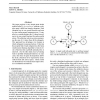651 search results - page 34 / 131 » Algorithms for Inverse Reinforcement Learning |
131
click to vote
GECCO
2009
Springer
15 years 7 months ago
2009
Springer
We apply CMA-ES, an evolution strategy with covariance matrix adaptation, and TDL (Temporal Difference Learning) to reinforcement learning tasks. In both cases these algorithms se...
116
click to vote
ICML
2008
IEEE
16 years 3 months ago
2008
IEEE
Rich representations in reinforcement learning have been studied for the purpose of enabling generalization and making learning feasible in large state spaces. We introduce Object...
107
click to vote
CIVR
2007
Springer
15 years 8 months ago
2007
Springer
Fusion of multimedia streams for enhanced performance is a critical problem for retrieval. However, fusion performance tends to easily overfit the hillclimb set used to learn fus...
213
Voted
ATAL
2008
Springer
15 years 4 months ago
2008
Springer
Multi-Agent Reinforcement Learning (MARL) algorithms suffer from slow convergence and even divergence, especially in large-scale systems. In this work, we develop a supervision fr...
109
click to vote
ICML
2003
IEEE
16 years 3 months ago
2003
IEEE
The paper explores a very simple agent design method called Q-decomposition, wherein a complex agent is built from simpler subagents. Each subagent has its own reward function and...


